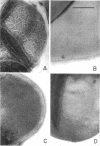Abstract
Chemical analyses of the cell walls of organisms isolated in various parts of the world from cases of lepromatous and tuberculoid leprosy make possible their assignment to one of the three genera: Corynebacterium, Mycobacterium, or Propionibacterium. One, bacterium 22M, remains unassigned. The combined chemical and enzymatic properties attributed to leprosy bacilli freshly harvested from lepromata are found collectively, but not individually, in these three genera.
Full text
PDF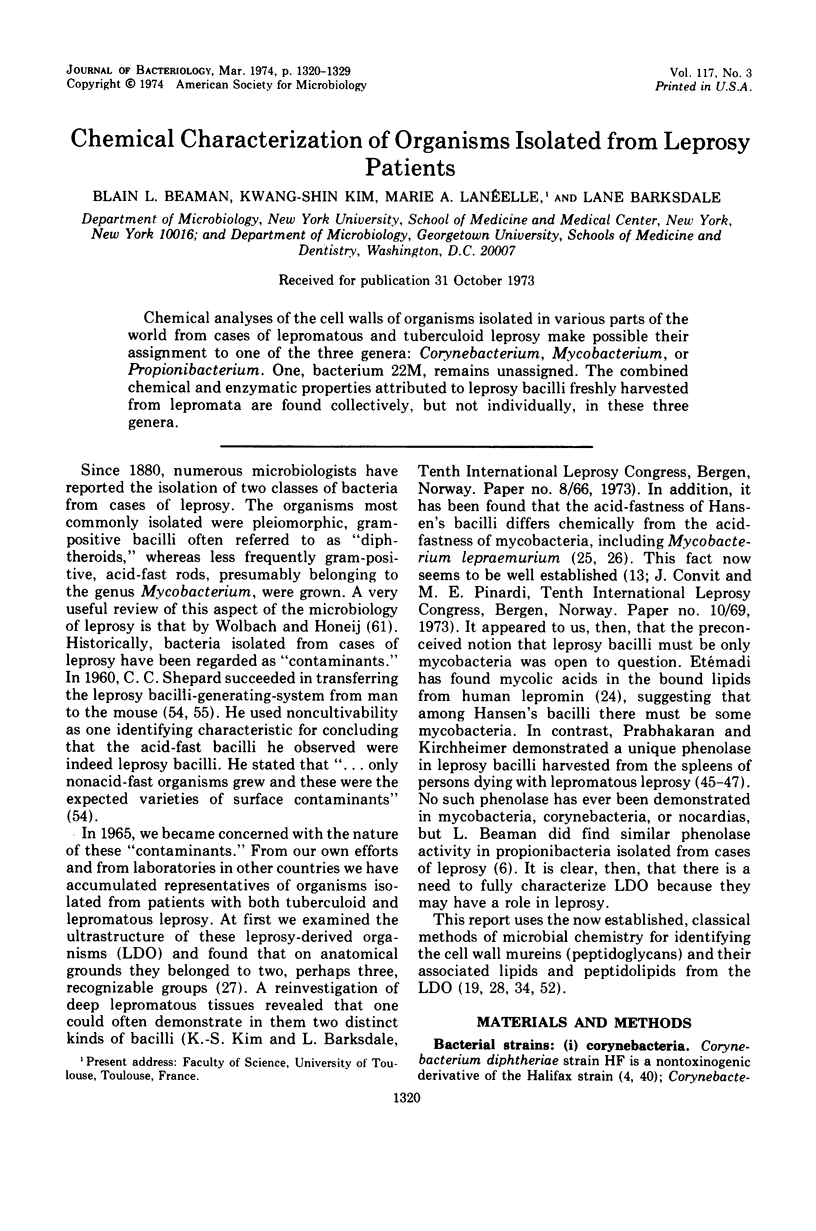
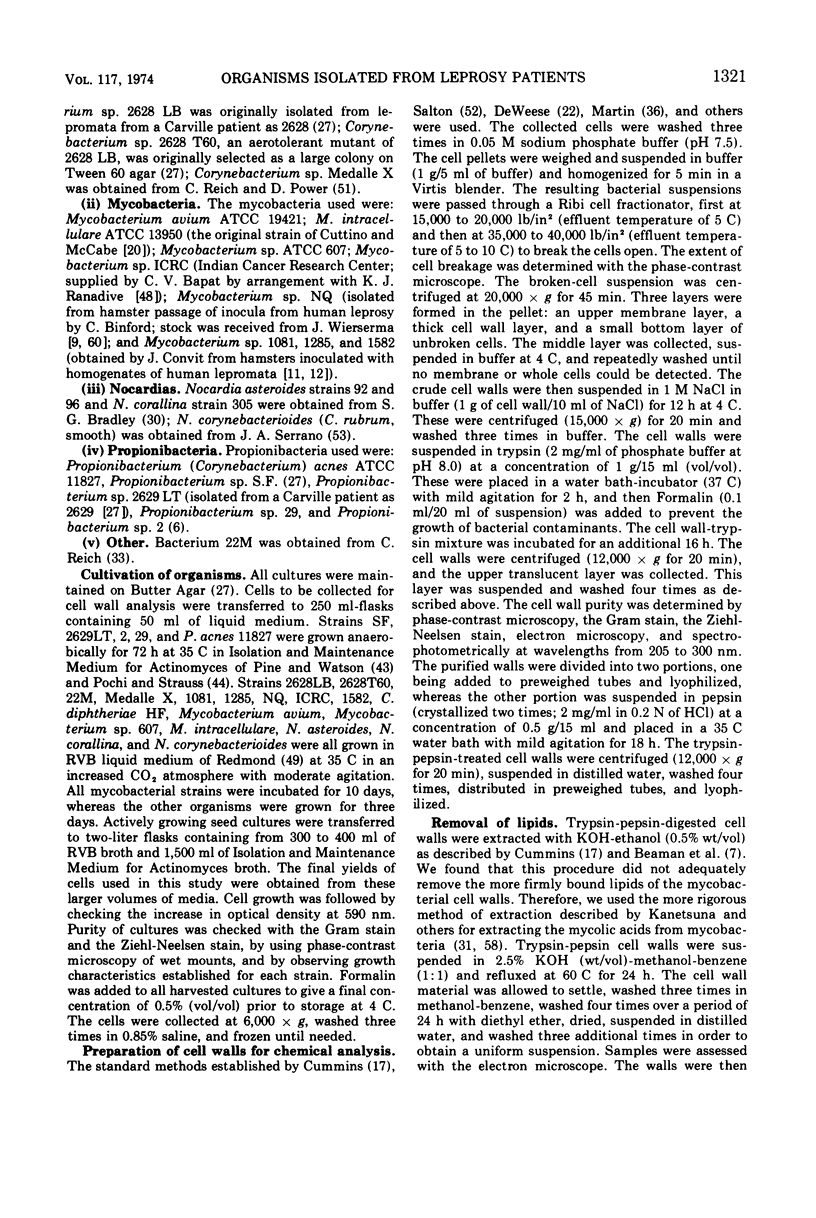
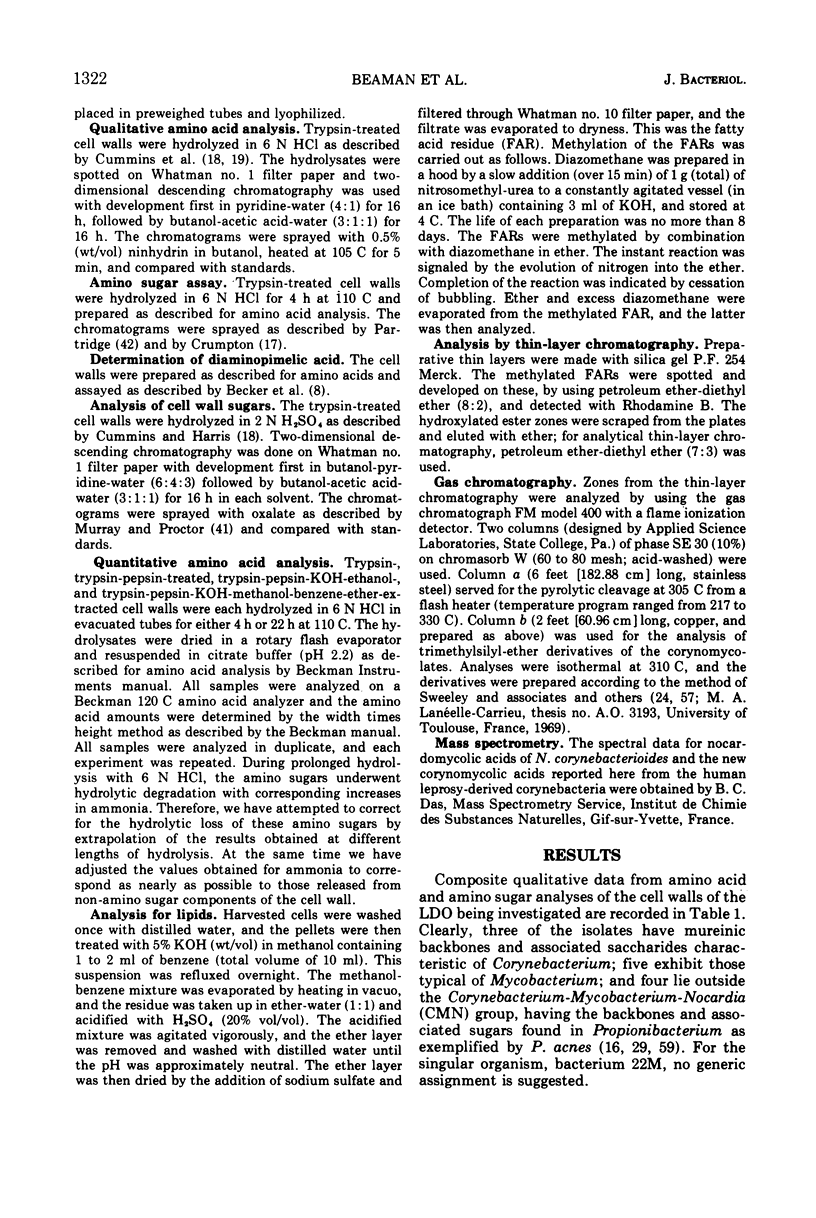
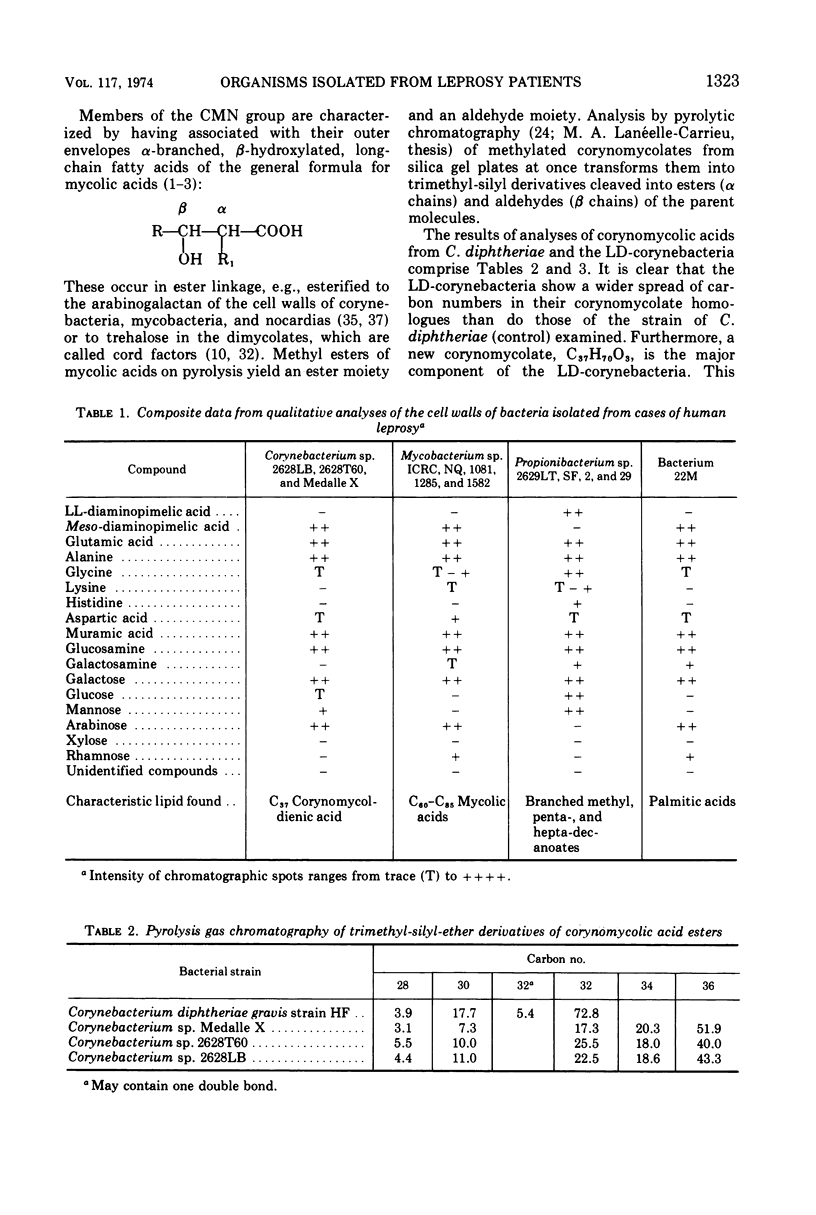
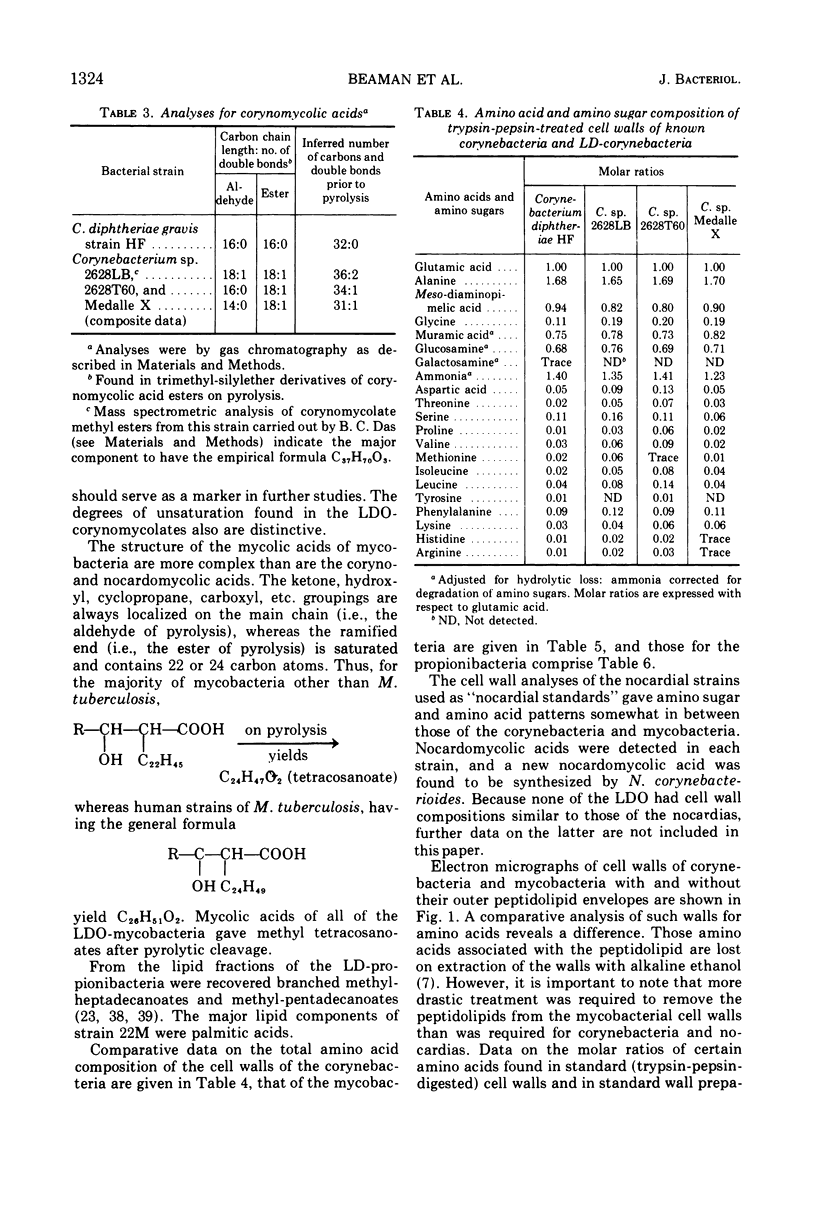
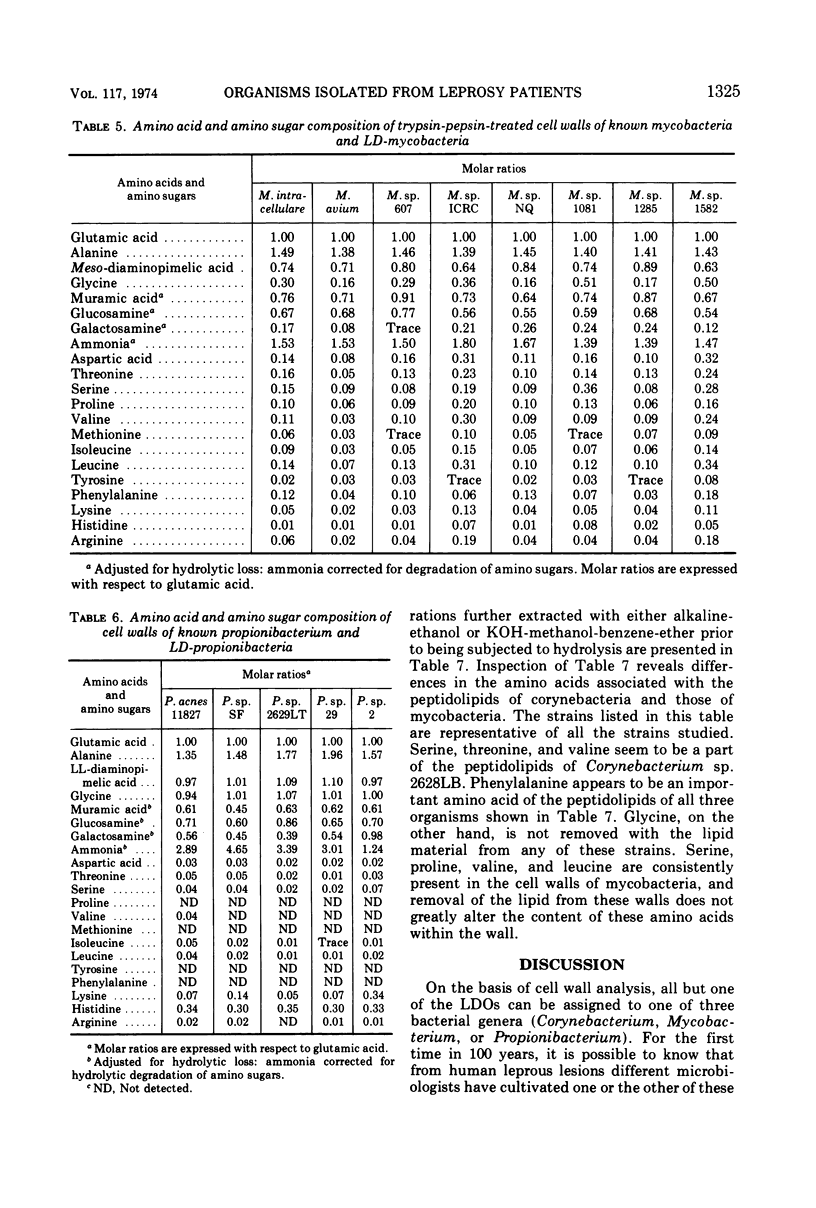
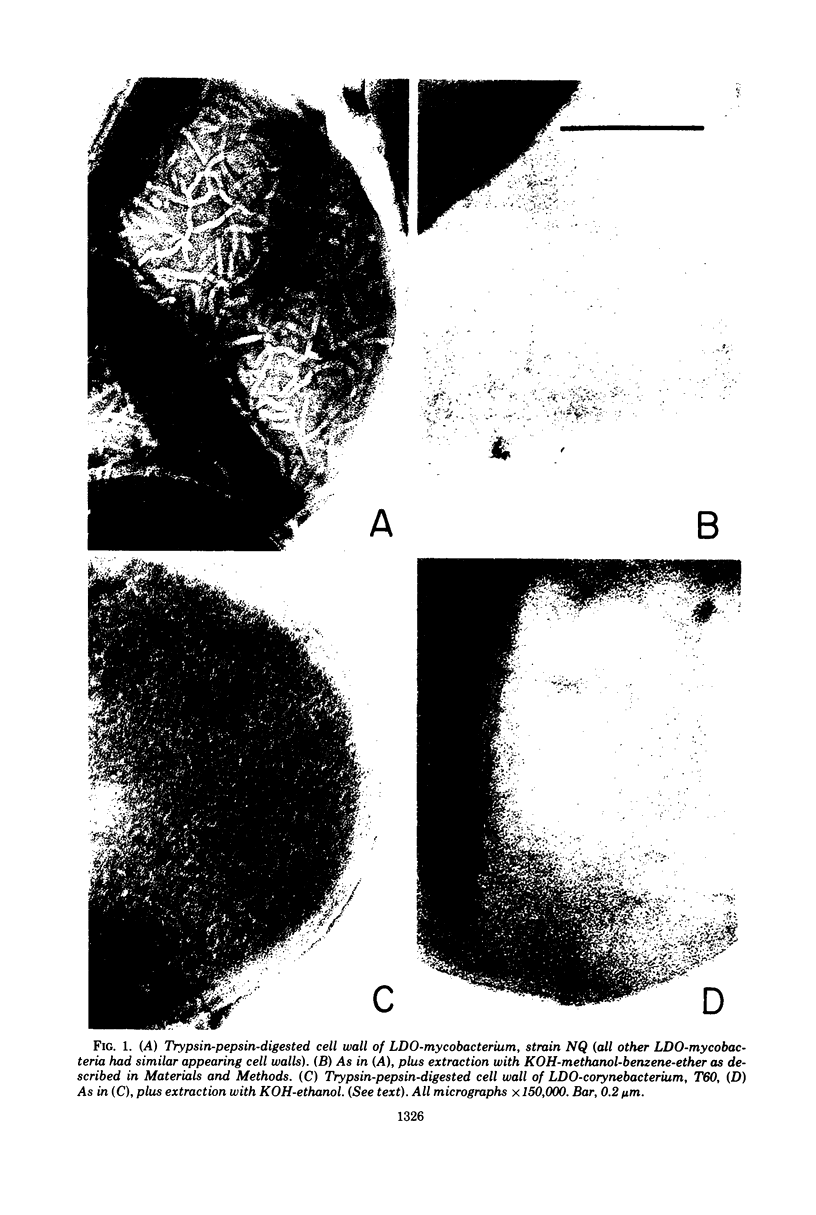
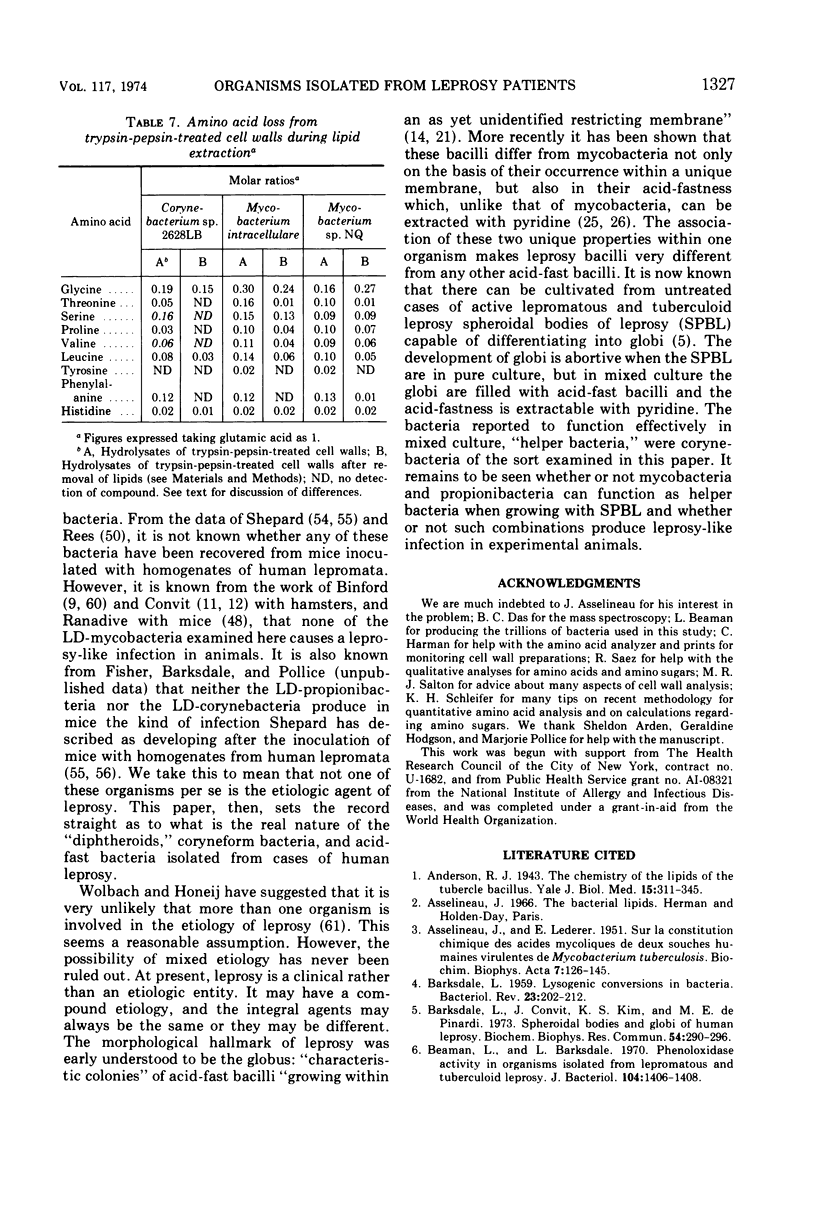
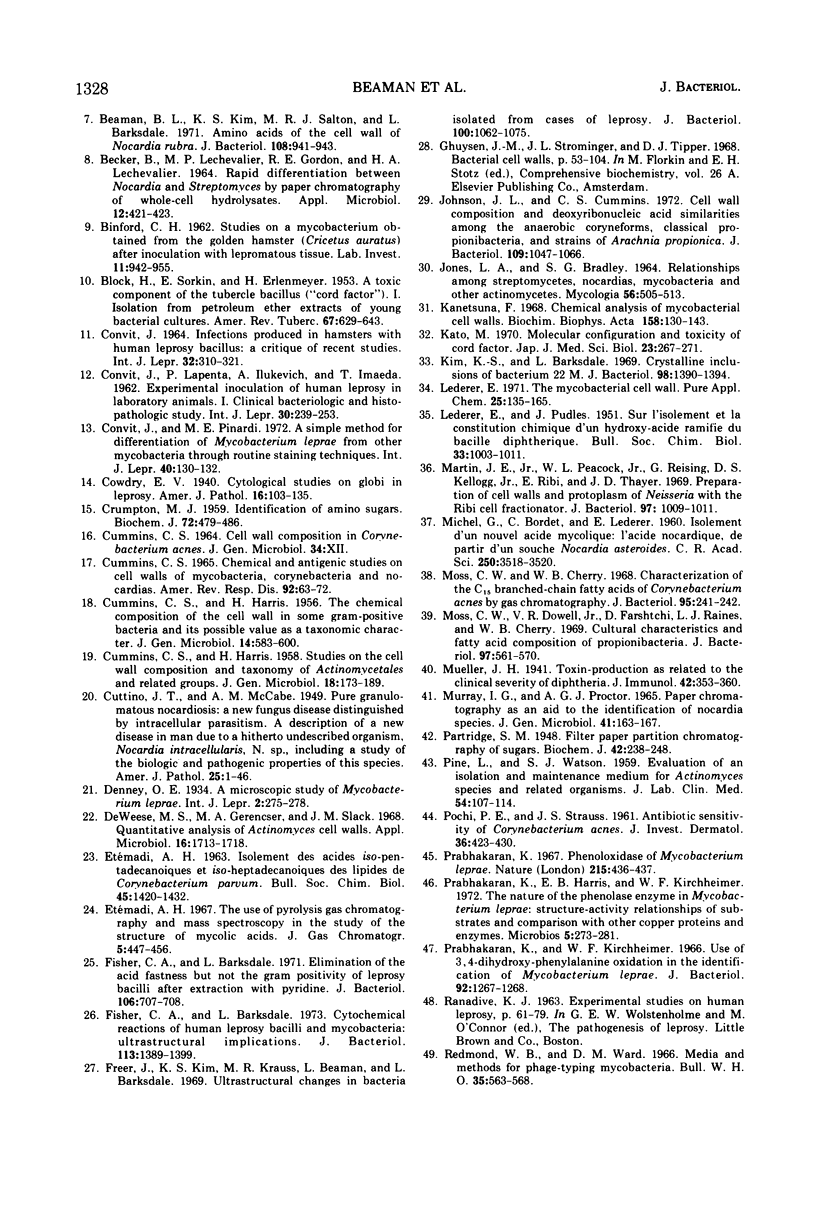
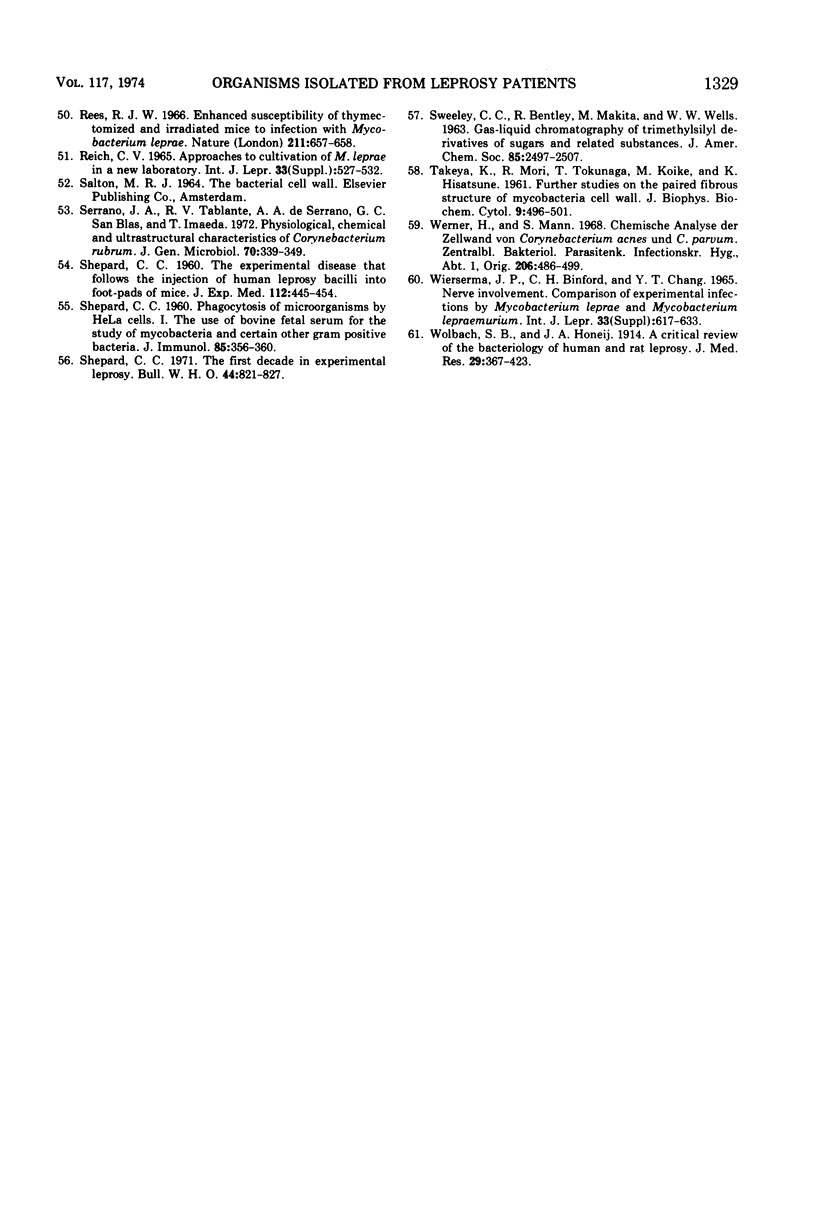
Images in this article
Selected References
These references are in PubMed. This may not be the complete list of references from this article.
- ASSELINEAU J., LEDERER E. Sur la constitution chimique des acides mycoliques de deux souches humaines virulentes de Mycobacterium tuberculosis. Biochim Biophys Acta. 1951 May;7(1):126–145. doi: 10.1016/0006-3002(51)90011-x. [DOI] [PubMed] [Google Scholar]
- BECKER B., LECHEVALIER M. P., GORDON R. E., LECHEVALIER H. A. RAPID DIFFERENTIATION BETWEEN NOCARDIA AND STREPTOMYCES BY PAPER CHROMATOGRAPHY OF WHOLE-CELL HYDROLYSATES. Appl Microbiol. 1964 Sep;12:421–423. doi: 10.1128/am.12.5.421-423.1964. [DOI] [PMC free article] [PubMed] [Google Scholar]
- BINFORD C. H. Studies on a Mycobacterium obtained from the golden hamster (Cricetus auratus) after inoculation with lepromatous tissue. Lab Invest. 1962 Nov;11:942–955. [PubMed] [Google Scholar]
- BLOCH H., SORKIN E., ERLENMEYER H. A toxic lipid component of the tubercle bacillus (cord factor). I. Isolation from petroleum ether extracts of young bacterial cultures. Am Rev Tuberc. 1953 May;67(5):629–643. doi: 10.1164/art.1953.67.5.629. [DOI] [PubMed] [Google Scholar]
- Barksdale L., Convit J., Kim K. S., de Pinardi M. E. Spheroidal bodies and globi of human leprosy. Biochem Biophys Res Commun. 1973 Sep 5;54(1):290–296. doi: 10.1016/0006-291x(73)90921-2. [DOI] [PubMed] [Google Scholar]
- Barksdale L. I. : Lysogenic Conversions in Bacteria. Bacteriol Rev. 1959 Dec;23(4):202–212. doi: 10.1128/br.23.4.202-212.1959. [DOI] [PMC free article] [PubMed] [Google Scholar]
- Beaman B. L., Kim K. S., Salton M. R., Barksdale L. Amino acids of the cell wall of Nocardia rubra. J Bacteriol. 1971 Nov;108(2):941–943. doi: 10.1128/jb.108.2.941-943.1971. [DOI] [PMC free article] [PubMed] [Google Scholar]
- Beaman L., Barksdale L. Phenoloxidase activity in organisms isolated from lepromatous and tuberculoid leprosy. J Bacteriol. 1970 Dec;104(3):1406–1408. doi: 10.1128/jb.104.3.1406-1408.1970. [DOI] [PMC free article] [PubMed] [Google Scholar]
- CONVIT J. INFECTIONS PRODUCED IN HAMSTERS WITH THE HUMAN LEPROSY BACILLUS: A CRITIQUE OF RECENT STUDIES. Int J Lepr. 1964 Jul-Sep;32:310–321. [PubMed] [Google Scholar]
- CONVIT J., LAPENTA P., ILUKEVICH A., IMAEDA T. Experimental inoculation of human leprosy in laboratory animals. I. Clinical, bacteriologic, and histopathologic study. Int J Lepr. 1962 Jul-Sep;30:239–253. [PubMed] [Google Scholar]
- CRUMPTON M. J. Identification of amino sugars. Biochem J. 1959 Jul;72:479–486. doi: 10.1042/bj0720479. [DOI] [PMC free article] [PubMed] [Google Scholar]
- CUMMINS C. S., HARRIS H. Studies on the cell-wall composition and taxonomy of Actinomycetales and related groups. J Gen Microbiol. 1958 Feb;18(1):173–189. doi: 10.1099/00221287-18-1-173. [DOI] [PubMed] [Google Scholar]
- CUMMINS C. S., HARRIS H. The chemical composition of the cell wall in some gram-positive bacteria and its possible value as a taxonomic character. J Gen Microbiol. 1956 Jul;14(3):583–600. doi: 10.1099/00221287-14-3-583. [DOI] [PubMed] [Google Scholar]
- CUTTINO J. T., McCABE A. M. Pure granulomatous nocardiosis, a new fungus disease distinguished by intracellular parasitism; a description of a new disease in man due to a hitherto undescribed organism, Nocardia intracellularis, n. sp., including a study of the biologic and pathogenic properties of this species. Am J Pathol. 1949 Jan;25(1):1–47. [PMC free article] [PubMed] [Google Scholar]
- Convit J., Pinardi M. E. A simple method for the differentiation of Mycobacterium leprae from other mycobacteria through routine staining technics. Int J Lepr Other Mycobact Dis. 1972 Apr-Jun;40(2):130–132. [PubMed] [Google Scholar]
- Cowdry E. V. Cytological studies on globi in leprosy. Am J Pathol. 1940 Mar;16(2):103–136.9. [PMC free article] [PubMed] [Google Scholar]
- Cummins C. S. Chemical and antigenic studies on cell walls of mycobacteria, corynebacteria, and nocardias. Am Rev Respir Dis. 1965 Dec;92(6):63–72. doi: 10.1164/arrd.1965.92.6P2.63. [DOI] [PubMed] [Google Scholar]
- DeWeese M. S., Gerencser M. A., Slack J. M. Quantitative analysis of Actinomyces cell walls. Appl Microbiol. 1968 Nov;16(11):1713–1718. doi: 10.1128/am.16.11.1713-1718.1968. [DOI] [PMC free article] [PubMed] [Google Scholar]
- ETEMADI A. H. ISOLEMENT DES ACIDES ISOPENTAD'ECANOUIQUE ET ISOHEPTAD'ECANOUIQUE DES LIPIDES DE CORYNEBACTERIUM PARVUM. Bull Soc Chim Biol (Paris) 1963;45:1423–1432. [PubMed] [Google Scholar]
- Fisher C. A., Barksdale L. Cytochemical reactions of human leprosy bacilli and mycobacteria: ultrastructural implications. J Bacteriol. 1973 Mar;113(3):1389–1399. doi: 10.1128/jb.113.3.1389-1399.1973. [DOI] [PMC free article] [PubMed] [Google Scholar]
- Fisher C. A., Barksdale L. Elimination of the acid fastness but not the gram positivity of leprosy bacilli after extraction with pyridine. J Bacteriol. 1971 May;106(2):707–708. doi: 10.1128/jb.106.2.707-708.1971. [DOI] [PMC free article] [PubMed] [Google Scholar]
- Freer J., Kim K. S., Krauss M. R., Beaman L., Barksdale L. Ultrastructural changes in bacteria isolated from cases of leprosy. J Bacteriol. 1969 Nov;100(2):1062–1075. doi: 10.1128/jb.100.2.1062-1075.1969. [DOI] [PMC free article] [PubMed] [Google Scholar]
- Johnson J. L., Cummins C. S. Cell wall composition and deoxyribonucleic acid similarities among the anaerobic coryneforms, classical propionibacteria, and strains of Arachnia propionica. J Bacteriol. 1972 Mar;109(3):1047–1066. doi: 10.1128/jb.109.3.1047-1066.1972. [DOI] [PMC free article] [PubMed] [Google Scholar]
- Kanetsuna F. Chemical analyses of mycobacterial cell walls. Biochim Biophys Acta. 1968 Apr 16;158(1):130–143. doi: 10.1016/0304-4165(68)90080-9. [DOI] [PubMed] [Google Scholar]
- Kato M. Molecular configuration and toxicity of cord factor. Jpn J Med Sci Biol. 1970 Aug;23(4):267–271. [PubMed] [Google Scholar]
- Kim K. S., Barksdale L. Crystalline inclusions of bacterium 22M. J Bacteriol. 1969 Jun;98(3):1390–1394. doi: 10.1128/jb.98.3.1390-1394.1969. [DOI] [PMC free article] [PubMed] [Google Scholar]
- LEDERER E., PUDLES J. Sur l'isolement et la constitution chimique d'un hydroxyacide ramifié du bacille diphtérique. Bull Soc Chim Biol (Paris) 1951;33(8):1003–1011. [PubMed] [Google Scholar]
- Lederer E. The mycobacterial cell wall. Pure Appl Chem. 1971;25(1):135–165. doi: 10.1351/pac197125010135. [DOI] [PubMed] [Google Scholar]
- Martin J. E., Jr, Peacock W. L., Jr, Reising G., Kellogg D. S., Jr, Ribi E., Thayer J. D. Preparation of cell walls and protoplasm of Neisseria with the Ribi cell fractionator. J Bacteriol. 1969 Mar;97(3):1009–1011. doi: 10.1128/jb.97.3.1009-1011.1969. [DOI] [PMC free article] [PubMed] [Google Scholar]
- Moss C. W., Cherry W. B. Characterization of the C15 branched-chain fatty acids of Corynebacterium acnes by gas chromatography. J Bacteriol. 1968 Jan;95(1):241–242. doi: 10.1128/jb.95.1.241-242.1968. [DOI] [PMC free article] [PubMed] [Google Scholar]
- Moss C. W., Dowell V. R., Jr, Farshtchi D., Raines L. J., Cherry W. B. Cultural characteristics and fatty acid composition of propionibacteria. J Bacteriol. 1969 Feb;97(2):561–570. doi: 10.1128/jb.97.2.561-570.1969. [DOI] [PMC free article] [PubMed] [Google Scholar]
- Murray I. G., Proctor A. G. Paper chromatography as an aid to the identification of Nocardia species. J Gen Microbiol. 1965 Nov;41(2):163–167. doi: 10.1099/00221287-41-2-163. [DOI] [PubMed] [Google Scholar]
- PINE L., WATSON S. J. Evaluation of an isolation and maintenance medium for Actinomyces species and related organisms. J Lab Clin Med. 1959 Jul;54(1):107–114. [PubMed] [Google Scholar]
- POCHI P. E., STRAUSS J. S. Antibiotic sensitivity of Corynebacterium acnes (Propionibacterium acnes). J Invest Dermatol. 1961 Jun;36:423–429. doi: 10.1038/jid.1961.66. [DOI] [PubMed] [Google Scholar]
- Partridge S. M. Filter-paper partition chromatography of sugars: 1. General description and application to the qualitative analysis of sugars in apple juice, egg white and foetal blood of sheep. with a note by R. G. Westall. Biochem J. 1948;42(2):238–250. doi: 10.1042/bj0420238. [DOI] [PMC free article] [PubMed] [Google Scholar]
- Prabhakaran K., Harris E. B., Kirchheimer W. F. The nature of the phenolase enzyme in Mycobacterium leprae: structure-activity relationships of substrates and comparison with other copper proteins and enzymes. Microbios. 1972;5(20):273–281. [PubMed] [Google Scholar]
- Prabhakaran K., Kirchheimer W. F. Use of 3,4-Dihydroxyphenylalanine Oxidation in the Identification of Mycobacterium leprae. J Bacteriol. 1966 Oct;92(4):1267–1268. doi: 10.1128/jb.92.4.1267-1268.1966. [DOI] [PMC free article] [PubMed] [Google Scholar]
- Prabhakaran K. Phenoloxidase of Mycobacterium leprae. Nature. 1967 Jul 22;215(5099):436–437. doi: 10.1038/215436a0. [DOI] [PubMed] [Google Scholar]
- Redmond W. B., Ward D. M. Media and methods for phage-typing mycobacteria. Bull World Health Organ. 1966;35(4):563–568. [PMC free article] [PubMed] [Google Scholar]
- Rees R. J. Enhanced susceptibility of thymectomized and irradiated mice to infection with Mycobacterium leprae. Nature. 1966 Aug 6;211(5049):657–658. doi: 10.1038/211657a0. [DOI] [PubMed] [Google Scholar]
- Reich C. V. Approaches to cultivation of M. leprae in a new laboratory. Int J Lepr. 1965 Jul-Sep;33(3 Suppl):527–532. [PubMed] [Google Scholar]
- Serrano J. A., Tablante R. V., de Serrano A. A., de San Blas G. C., Imaeda T. Physiological, chemical and ultrastructural characteristics of Corynebacterium rubrum. J Gen Microbiol. 1972 Apr;70(2):339–349. doi: 10.1099/00221287-70-2-339. [DOI] [PubMed] [Google Scholar]
- Shepard C. C. The first decade in experimental leprosy. Bull World Health Organ. 1971;44(6):821–827. [PMC free article] [PubMed] [Google Scholar]
- TAKEYA K., MORI R., TOKUNAGA T., KOIKE M., HISATSUNE K. Further studies on the paired fibrous structure of mycobacterial cell wall. J Biophys Biochem Cytol. 1961 Feb;9:496–501. doi: 10.1083/jcb.9.2.496. [DOI] [PMC free article] [PubMed] [Google Scholar]
- Werner H., Mann S. Chemische Analyse der Zellwand von Corynebacterium acnes und C. parvum. Zentralbl Bakteriol Orig. 1968 May;206(4):486–499. [PubMed] [Google Scholar]
- Wiersema J. P., Binford C. H., Chang Y. T. Nerve involvement. Comparison of experimental infections by Mycobacterium leprae and Mycobacterium lepraemurium. Int J Lepr. 1965 Jul-Sep;33(3 Suppl):617–633. [PubMed] [Google Scholar]



